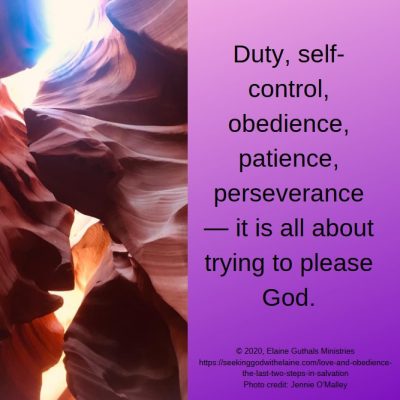In order to restore our relationship with Him, God designed the plan of salvation. We’ve already talked about the first step of belief. This devotion discusses the last two steps: love and obedience.
Nuggets
- Once we have faith in our Sovereign God, we grow to love Him.
- God wants us to obey His laws and commandments.
- Duty, self-control, obedience, patience, perseverance — it is all about trying to please God.
- We don’t earn salvation by doing the do’s and not doing the don’ts, but that does come after conversion.
- Imitating Jesus because we love Him takes it out of feeling like a duty.
Love and Obedience: The Last Two Steps in Salvation

In the last devotion, we began looking at Maclaren’s sentence about salvation. He wrote, “The ladder that has its summit in heaven has for its rungs, first, ‘believe’; second, ‘love’; third, ‘obey.’”
The last devotion looked at “believe.” This devotion is going to look at “love” and “obey.”
Let's Put It into Context
“Now without faith it is impossible to please God, since the one who draws near to him must believe that he exists and that he rewards those who seek him” (Heb. 11: 6 CSB)
The foundation of salvation is belief. That has components of faith, access, and reward.
Faith is the belief that the doctrines stated in God’s Word are true, even if we do not understand all aspects of them. It starts with knowledge.
But our faith is limited to our understanding. So, we have to trust God in what we don’t understand. Trust is confidence that the promises of God are true.
Because we have faith, we seek God. In order to approach God, we have to believe there is a God. We have to believe that our relationships with Him need to be restored.
We have to have faith that, as we ask in prayer, God will reward us.
Love
“And he answered, “You shall love the Lord your God with all your heart and with all your soul and with all your strength and with all your mind, and your neighbor as yourself’” (Lk. 10: 27 ESV)
Once we have faith in our Sovereign God, we grow to love Him. We’ve talk about the two greatest commandments before. For this devotion, we are just going to focus on loving God.
Staney asserted that love for God should govern our entire being. He felt this should stem for our search for truth and find expression in how we tend ourselves in order to live our lives.
Searching for and Seeking God
Hearing His Word (Rom. 10: 17).
Reading His Word (Rev. 1: 3).
Praying to Him (Heb. 4: 16).
Studying His Word (Ac. 17: 11).
Meditating on His Word (Ps. 1: 1-2).
Memorizing His Word (Ps. 119: 11).
Thomson reminded us that this love was to be fear of the Lord reverence. He wrote, “Accustomed to see their enemies punished by the immediate interference of the Deity; and sensible of the sufferings inflicted on themselves for their idolatry and their incessant hankering after the imaginary gods of the heathens, they contemplated the true God rather as an object of fear than of love.”
But we have to remember that New Testament godliness is equivalent to Old Testament fear of the Lord. That is where we see God’s mercy and love.
Maclaren wrote, “No man becomes ‘godly’ by mere desiring. The bridge between faith and godliness is made of manly strength, discrimination and discernment of duty, rigid self-control, patient perseverance.” That has a lot packed into it!
Okay, we are going to look at duty when we get to the Church category. For now, let’s consider duty as doing God’s Will.
What does God want us to do? He wants us to obey His laws and commandments.
We talked about self-control a couple of times. I had considered making self-control my word of the year but went with self-discipline instead. We also talked about it when we talked virtues. Obedience can only be attained when human passions can be controlled.
To read a related devotion, click the appropriate button below.
We’ve also talked patience and perseverance lately — in fact, we said they were linked. Perseverance is all about calmly enduring going from milk babies to steak adults.
To read a related devotion, click the appropriate button below.
Duty, self-control, obedience, patience, perseverance — it is all about trying to please God. Because we love Him, we want to do what He wants us to do. We show that by spending time with Him in prayer and obeying His laws and commandments.

Obey
“I will place my Spirit within you and cause you to follow my statutes and carefully observe my ordinances” (Ezek. 36: 27 CSB)
I know I am repeating myself. To love God is to obey Him.
So many times, in the past, I think people have been told that all they have to do is love God. And that is true.
We don’t earn salvation by doing the do’s and not doing the don’ts. But that does come after conversion.
We can’t stop at the love God part. We have to show that love by obeying Him.
This is where we should imitate Jesus. Guthrie wrote, “They who would live like Jesus must look to Jesus.” This is evidence of submission.
What greater motive to imitate Jesus than to love Jesus? That takes it out of feeling like it is a duty. It makes it more genuine.
Making the Connections
I think salvation is one of those three-part words. We were saved the instant that God forgave our sins.
But that didn’t mean salvation was over. Our job description says we need to work out our salvation. We do that as we navigate the sanctification road. Sanctification is the transformation of mind, body, and soul beginning with regeneration and ending with perfected state of spiritual wholeness or completeness. That makes salvation a process.
The Disciple’s Job Description
Complete Job Description
Individual Description
Job Duty #2
Work Out Our Salvation (Philippians 2: 12)
Yes, we don’t reach the end of the sanctification road until we are made perfect. That isn’t going to happen until we reach heaven.
Making the Connections to Self-Discipline
The plan of salvation can be difficult for non-believers to understand. We need to get them to realize that it is a process that they will be undertaking for the rest of their lives.
We are also considering what we would say if a non-believer asked us about this process. Here is the worksheet again. What would you tell someone who questions God authority to judge sin?
- What does the Scriptures say?
- What do I believe?
- Why do I believe the same/differently than the Scriptures?
- What are the talking points when witnessing to a non-believer?
Related Links
I have created a worksheet of the questions above. Click on the button below to access it.
How Do We Apply This?
Do we sometimes feel like the lawyer in Luke 10? Do we feel like we cannot love God enough?
Segaud had a great list that we can use to evaluate where we are so we can determine what changes need to be made.
- “Do you obey all that He commands?”
- “Do you obey in such a manner as He requires of you?”
- “Do you obey because God commands?”
- Do you possess a love of subjection and dependence?
- “Do you say with Job, ‘“The Lord gave,’” and the Lord takes away? (Job 1:21).
- “Do you complain, as though God was unjust?”
- “Do you embrace the cross [God sends you diseases and afflictions]”?
- “Do you honour and love Him [when He punishes you]”?
- “Do you love God more than all else?”
- “Do you love whatever God loves, and hate whatever He hates?”
- “Does it afford you delight to reflect on God, to converse with Him by prayer, &c.?”
- “Do you long for the possession of God?”
God offers us the gift of salvation, but He does have expectations that come with it.
Loving Heavenly Father. We want to imitate You. You are love, so we want to be love. We want to obey You. Help us to follow Your laws and commandments so that we may become holy and righteous like You. Amen.
What do you think?
Leave me a comment below (about this or anything else) or head over to my Facebook group for some interactive discussion.
If you don’t understand something and would like further clarification, please contact me.
If you have not signed up for the email daily or weekly providing the link to the devotions and the newsletter, do so below.
If God has used this devotion to speak with you, consider sharing it on social media.
Pingback: Submitting to Wakefulness – Seeking God with Elaine